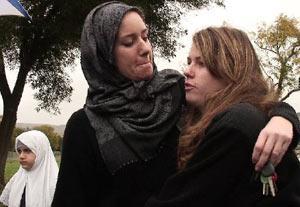Solidarity in Fremont, California: Many Wear Hijabs/Turbans
 Sisters, Rachel and Jilliann Lau, of Mountain View listen to speakers during the Wear a Hijab/Turban Day at Central Park in Fremont.
Sisters, Rachel and Jilliann Lau, of Mountain View listen to speakers during the Wear a Hijab/Turban Day at Central Park in Fremont.
On October 19, Alia Ansari (38) was killed by a single bullet to the head as she walked with her 3-year-old daughter on a well-to-do residential street in Fremont, California. She was distinguished by a hijab, the head scarf worn by some devout Muslim women. The Afghan immigrant had no purse or money on her, family members said. Stunned relatives and Muslim leaders said the only motive they could see, outside of insanity, would be hatred.
"Whoever did this did not see Alia Ansari, a mother of six children," said Sheikh Hamza Yusuf, one of the nation's most respected Muslim scholars and leaders, who spoke to the media outside of the Ansaris' modest two-bedroom apartment. "He saw a symbol of something that people are taught to hate."
"What happened here is an act of terrorism," said Rona Popal, executive director of the Afghan Coalition, which provides services to the community. "There is no reason to shoot an innocent woman walking down the street, holding her child."
Local Muslim leaders and the victim's relatives attributed blame to an American culture of violence, propagated through movies and video games that reward players for killing. In addition, they said things such as talk radio, politicians and religious zealotry by some Christians had focused on Muslims since the Sept. 11 attacks.
Three women at the Islamic Society of the East Bay said they would continue to wear head scarves even if the killing was a hate crime. "Even if they wiped out everyone on Earth, I would not remove the hijab," said Suzanne Azim, 43, a Hayward resident.
The Fremont community responded by coming together on November 13 for a "Wear a Hijab/Turban Day" along with an "international moment of silence," a rally featuring various local politicians and community speakers. Attendees wore headscarfs, turbans, hats, yarmulkes in solidarity.
Melanie Gadener, founder of the Foundation for Self Reliance, a non-profit organization that promotes "economic independence in the Afghan community," the event is an opportunity for "an intriguing social experiment,""What if women of all religions pledged to wear a Muslim head covering, a hijab,for one day? How might people treat you differently if, for one day, the only thing different about you was what you were wearing on your head?"


1 Comments:
IT's a great way to show who's a muslim and who's not. I think we should force them all to wear the hijab, not just some. Bit like in Germany how Hitler made the Jews wear a yellow star, why not yellow hijabs?
Post a Comment
<< Home